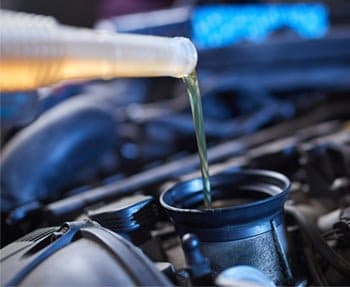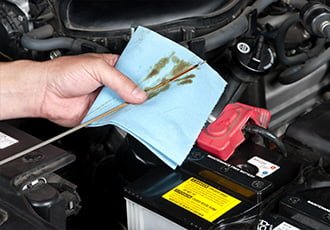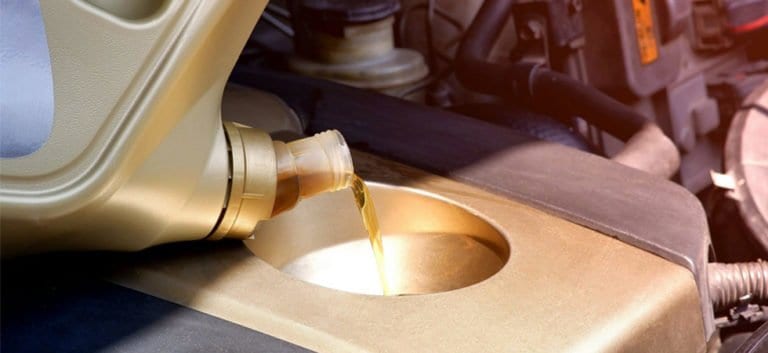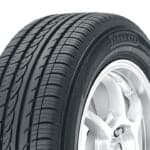Affiliate Disclosure: Some of the links in this post are affiliate links. As an Amazon Associate, we earn from qualifying purchases. Read more in our affiliate policy.

0w40 Vs 5W40 Debate – Which Of These Grades Will Work The Best For You
Oil grades are a pretty challenging topic for first-time car owners. The 0W40 vs 5W40 debate is particularly popular, especially in areas with cold winters because these grades are suitable for low temperatures.
But what actually is the difference between these two oil grades? And how do you know which oil is the right choice for you?
GarageChief.com will provide answers to these questions below.
0W40 Vs 5W40 – What Is The Difference?
The only difference between the 0W40 and 5W40 oil grades is their low-temperature performance, as evident from the first number in the rating. 0W40 oil can maintain adequate viscosity for proper engine operation at lower temperatures than 5W40 oil.
Some people also wonder whether there are any formulation differences between 0W40 and 5W40 oil grades. Like, maybe 0W40 are only conventional oils, while 5W40 oils are mostly full synthetic.
Well, there are no notable differences between the two grades in this regard – you should be able to find both in a full synthetic, synthetic blend, and conventional formulations.

The Importance Of Viscosity In Motor Oils
Before providing you with a deeper insight into the differences between 0W40 and 5W40 oils, we should briefly cover why viscosity is important in motor oils. This will help you understand better what we will be talking about a little bit later.
The purpose of motor oils is to lubricate engine components to reduce friction and thus wear and heat output.

Besides, motor oils are formulated to fight off sludge formation and remove its existing deposits.
With this in mind, motor oils:
- Shouldn’t be too viscous (in other words, thick) because high viscosity will impede their ability to ensure adequate flow and lubrication of the motor components.
- At the same time, motor oils shouldn’t be too watery (thin) because oils that are too thin will not be able to form a protective film between engine components. As a result, friction will reappear, leading to overheating, physical wear, and possibly irreversible engine damage.
Temperature plays a key role in oil viscosity. This is because:
- At low temperatures, oil becomes more viscous. As mentioned above, viscous motor oils flow with difficulty and thus can’t ensure proper lubrication of the engine.
- At high temperatures, oil becomes less viscous and waterier. Again, if the oil gets too watery, it won’t be able to separate engine surfaces from each other.
Motor oils have varying temperature resistances – some do better at high and/or low temperatures than others.
Motor oil’s SAE (Society of Automotive Engineers) oil grade will show you how it will perform under different temperatures.
Reading SAE Oil Grades
Now that we know why viscosity is important and how oil behaves at different temperatures, we can talk about reading SAE oil grades. Although our guide will teach you how to read oil grades in general, you will also get a better idea of the differences between 0W40 and 5W40 oil grades.
SAE oil grades consist of two key parts – low- and high-temperature ratings. Let’s talk about these in more detail.
Low-temperature rating
The first number and the letter “W” denote the cold-temperature performance of motor oils. Here, “W” stands for “Winter”. The lower the number is, the colder temperatures the oil will be able to tolerate without becoming too viscous for normal operation.

With that in mind, 0W40 oil can stay sufficiently thin for adequate flow at lower temperatures than 5W40 motor oil.
This translates to quicker startups and safer operation the engine isn’t warmed up.
Low-temperature ratings go from 0W to 25W. Thus, 0W oil is the most cold-resistant motor oil you can find out there.
5W motor oil is also pretty cold-resistant, but it will become too thick at the temperatures at which 0W oil will operate just fine.
High-temperature rating
The second number – in our case, 40 – denotes the high-temperature rating of the motor oil. The higher this number, the higher temperatures the motor oil can endure before becoming too watery for proper lubrication.
The high-temperature performance of motor oils is determined by measuring the oil viscosity at 100 degrees Celsius (212 degrees Fahrenheit). The thicker the oil is at this temp, the higher its rating will be.
Thus, 0W30 motor oil would be less resistant to high temperatures than 0W40 oil, for example. 0W30 would become watery at lower temperatures than 0W40 motor oil, while the latter would be able to stay viscous enough for safe operation longer and at higher temps.
In terms of high temperatures, 0W40 and 5W40 motor oils will show identical viscosity. Not only that, but they are pretty heat-resistant all in all.
High-temperature ratings go from 20 to 60, so 40-rated oils work pretty nice in hot climates. However, neither 0W40 and 5W40 oils will be able to tolerate extreme heat.
SAE Viscosity Grades For Engine Oils – SAE J300 Dec 99
| SAE Viscosity Grade | High Shear Rate Viscosity @ 150 Degrees Celsius (mPa.s) | Maximum Viscosity @100 Degrees Celsius (mm 2/s) | Minimum Viscosity @ 100 Degrees Celsius (mm 2/s) | |
|---|---|---|---|---|
| 60 | 3.7 | <26.1 | 21.9 | |
| 50 | 3.7 | <21.9 | 16.3 | |
| 40 | 3.7** | <16.3 | 12.5 9.3 | |
| 30 | 2.9 | <12.5 | 9.3 | |
| 20 | 2.6 | <9.3 | 5.6 | |
| 25W | Data unavailable | Data unavailable | 9.3 | |
| 20W | Data unavailable | Data unavailable | 5.6 | |
| 15W | Data unavailable | Data unavailable | 5.6 | |
| 10W | Data unavailable | Data unavailable | 4.1 | |
| 5W | Data unavailable | Data unavailable | 3.8 | |
| 0W | Data unavailable | Data unavailable | 3.8 |
5W40 vs 0W40 – What About Fuel Efficiency?
Low viscosity is typically associated with fuel savings. This is because thinner oils put less strain on the pump and other components of the engine, allowing them to conserve energy and thus fuel.
This to some extent also applies to 0W40 and 5W40 motor oils. In theory, at low temperatures, 0W40 oil should be more fuel-efficient than 5W40 because it will be thinner. However, real-world fuel savings probably won’t be very noticeable.
As we’ve explained earlier, the only difference between these oil grades is that one is more resistant to cold than another. At operating temperatures, the two grades are identical.
Because engines heat up relatively quickly and stay hot for the entire duration of their operation, you won’t be seeing meaningful fuel savings with 0W40 oil versus 5W40 oil. The time while the oil is cold is too short for you to see big differences.
In contrast, if we were to compare 0W30 oil with 0W40 oil, the former would offer more noticeable fuel savings due to its lower viscosity at operating temperatures.
So although lower viscosity does imply some fuel savings with more cold-resistant motor oils, in practice, you probably won’t notice any serious differences, so comparing 5W40 vs 0W40 oil in terms of fuel efficiency is pretty much pointless.
5W40 Oil Vs 0W40 – Which One Should You Choose?
Both oils are great all-around options for areas where winters are cold while summers are hot. With that said, for very cold winters, 0W40 oil will be a better choice thanks to its higher low-temperature resistance.
On the other hand, for milder winters, 5W40 will be a better choice. Though 0W40 oil will work okay in mild winters as well, it will be thinner at a startup than 5W40 oil. This may translate to inadequate engine protection with 0W40 motor oils in mild colds.

Our 0W40 and 5W40 Oil Suggestions
If you happen to be looking for 0W40 or 5W40 motor oil, then allow us to offer a few options to you.
These should work for many of our readers. But even if you don’t find what you are shopping for, hopefully, our picks will provide you with some guidance as to what kind of oils you can find.
Top Rated 0W40 Oil Suggestions
Castrol EDGE Advanced Full Synthetic Motor Oil
For demanding applications, full synthetic motor oils like Castrol EDGE are usually an ideal choice. EDGE isn’t the most high-performance motor oil on our list, but it’s a nice option if your car is used heavily and your budget is limited.
The highlight of Castrol EDGE is the so-called fluid titanium that is advertised to be able to maintain low friction and reduced engine wear even under extreme pressures. Apart from that, formulated stronger than typical full synthetic oils and 3x stronger than some undisclosed “leading full synthetic”, EDGE is resistant against viscosity breakdown in extreme operating conditions.
Notably, Castrol EDGE works with both diesel and gasoline engines. However, Castrol discloses that this oil doesn’t work with diesel engines fitted with diesel particulate filters (DPF). The EDGE motor oil also works with either naturally aspirated or turbocharged engines.
If you own a Europe-made car, then Castrol EDGE may also be the right choice for you. As of this review, EDGE met certifications like Mercedes-Benz 229.5 & 229.3, Porsche A40, VW 505.00 & 502.00., and PSA B71 2296. EDGE should also work well with Ford vehicles since it meets the Ford WSS-M2C937-A certification.
Apart from these, EDGE also meets the requirements of API SN/CF, ACEA A3, B3, B4, and A3/B4.
Note that EDGE used to be BMW LL-1-certified. New batches of the EDGE oil do not meet this certification. Castrol has changed EDGE’s product description to reflect this change, but some old buyers haven’t noticed the change and mistakenly purchased this oil.If you’ve ever used EDGE or similar motor oil that was BMW LL-1-certified, don’t assume that the oil still holds the certification. Please read the product description and buyer reviews to make sure that the oil meets the required certifications. This applies not only to EDGE but also other motor oils on our list.
Castrol EDGE with Fluid TITANIUM
Mobil 1 Advanced Full Synthetic Motor Oil
Mobil 1 advanced full synthetic motor oil (marketed as Mobil 1 0W-40 European Car Formula in North America) appears to be higher-quality than Castrol EDGE, but it’s accordingly priced higher.
Like EDGE, this full synthetic motor oil is designed to meet the certifications of most European car manufacturers. Aside from that, this motor oil works with a wide range of engine types, including diesel (without DPF), gasoline, turbocharged, direct-injection, and even hybrid.
Mobil advertises that this full synthetic motor oil provides wear protection, lubrication, and high performance in any driving conditions.
With that said, the benefits of this motor oil will probably become the most apparent with heavy use – for lighter-duty cars, we feel that cheaper oil like Castrol EDGE would work better.
Liqui Moly Synthoil Energy Full Synthetic Motor Oil
Liqui Moly’s Synthoil Energy oil offers performance comparable to what you are getting with the Mobil 1 advanced full synthetic. With that said, this motor oil is a little pricier than Mobil’s option, as well as has some advantages that may interest you.
This isn’t evident from the product description, but the Liqui Moly motor oil appears to last longer and make the sound of the engine smoother. At least, this is what some buyers have experienced. As one buyer put it, the Mobil 1 0W-40 took 2-3 quarts every 5,000 miles, while the Liqui Moly oil took about a quart.
However, not every buyer has seen the same benefits in their cars – for some, Mobil’s oil worked better. So you’ll probably have to give both oils a try to see which one works better for your engine and your car use cases.
Like the previous two 0W40 oils on our list, this motor oil is a great pick for European cars. More specifically, Synthoil Energy meets certifications such as VW 502.00/505.00, MB 229.3, BMW Longlife-98, and Porsche A40. This motor oil is compliant with ACEA A3/B4 & API SM/CF certifications as well.
And like the Mobil 1 and Castrol 0W40 motor oils, Liqui Moly Synthoil Energy works with both diesel and gasoline engines.
Top Rated 5W40 Oil Suggestions
Shell Rotella T6 Full Synthetic Diesel Motor Oil
Shell Rotella’s T6 full synthetic motor oil is unique among our 5W40 suggestions in two ways.
First up, T6 is specifically designed for diesel engines. All other picks on our list are either for gasoline or diesel/gasoline.
The second remarkable feature in Shell Rotella T6 is that it is formulated to control turbocharger deposits. With that said, T6 should do a good job at general engine cleanup as well thanks to the dispersant additives contained in it.
What may also be important for some vehicle owners is that T6 pairs well with exhaust emission control systems thanks to its low-ash formulation. This formulation prevents the blocking of exhaust after-treatment devices.
As heavy-duty motor oil, T6 is also highly resistant to extreme shear & temperatures and maintains viscosity in a wide range of conditions.
Interestingly, Shell Rotella sometimes offers rebates with their oil purchases. However, not everybody has managed to make use of this program – buyers are being sometimes rejected due to technical issues, duplicate forms, and other issues that shouldn’t have happened in the first place.
This isn’t the first time we hear about such problems with Shell Rotella, so we’d advise that you don’t consider the rebate as an advantage for this oil. It may simply not work for you, so pay attention to other features & specs instead.
Valvoline Vehicle Full Synthetic SAE 5W-40 Motor Oil
This oil concentrates on three areas for the management of engine stress: tear, deposits, and heat. Running motors in very cold or high heat allow motors to operate faster, leading to a failure of engines. Valvoline improves the engine to withstand high temperatures.
Valvolinecontains custom clothing ingredients as well. For better safety, these additives stay in the crude. In fact, the special solution is consistent with a wide variety of cars and other equipment in terms of a fuel efficiency boost.
Valvoline products are known for their performance, which is obvious to this oil when dealing with supercharged, turbo-loaded vehicles, and natural aspirations. Changing every four thousand to five thousand miles results in a great performance.
Liqui Moly Molygen Full Synthetic Motor Oil
Finally, we have the Molygen full synthetic motor oil from Liqui Moly. This is pretty expensive motor oil, but it’s very highly rated by buyers and has a few interesting features to offer.
Most importantly, this motor oil contains the Molygen oil additive. This additive employs what’s called molecular friction control to reduce friction & wear and increase the longevity of the engine. Thus, Molygen should work very well with cars that are used heavily.
Apart from improved longevity, this motor oil should also deliver fuel savings thanks to the reduced friction, but we can’t tell whether you will indeed be saving fuel and how much you will be saving.
The Molygen motor oil also provides added protection during long oil change intervals, as well as reduces the formation of deposits on engine components.
Specification-wise, the Molygen oil is similar to Liqui Moly Leichtlauf – it meets BMW Longlife-01, MB 229.5, Porsche A40, Renault RN 0700, and VW 502.00/505.00 certifications. It’s also compliant with ACEA A3, B4, and API SN.
And like most other motor oil picks on our list, Molygen works with gasoline and diesel engines.
0W40 vs 5W40 – The Conclusion
Hopefully, the 0W40 vs 5W40 comparison is now a little bit clearer to you! No matter which oil grade you feel is better for your climate, please do make sure that you are getting the right kind of motor oil for your car.
Check out your car’s user manual to find motor oil recommendations specific to your car’s model.
Need Help Comparing Other Oil Grades?
If you’d like to compare other grades of motor oil, we have more interesting content published on our blog. They include:
Last update on 2024-04-24 / Affiliate links / Images from Amazon Product Advertising API
Disclaimers
All product names, logos, and brands are property of their respective owners. All company, product and service names used in this website are for identification purposes only. Use of these names, logos, and brands does not imply endorsement.
It is our policy to make every effort to respect the copyrights of outside parties. If you believe that your copyright has been misused, please provide us with a message stating your position and we will endeavor to correct any misuse immediately.
Some of the links in this post are affiliate links. As an Amazon Associate, we earn from qualifying purchases. This means if you click on the link and purchase the item, we may receive an affiliate commission, at no extra cost to you. This helps us keep this website alive. Read more in our affiliate policy.






